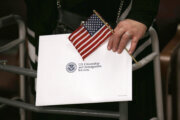The prosecution of Hunter Biden on federal firearms charges stems from a 7-page form that would-be gun buyers must fill out when purchasing a weapon from a licensed gun business. The form includes standard questions about things that would disqualify someone from legal gun ownership, like previous felony convictions, mental health problems or illegal drug use.
The drug question has landed Biden in court — prosecutors say he lied on the paperwork for a gun purchase in 2018 when he said he wasn’t using drugs. Biden’s attorneys say he didn’t consider himself a drug addict when he purchased the weapon.
While people are sometimes prosecuted for allegedly lying on the form, experts say it usually happens as part of a larger case involving more serious conduct, and cases like the one brought against Biden are rare.
Here, some things to know about the form and related weapons charges:
THE PAPERWORK
The Firearms Transaction Record, also known as ATF Form 4473, is essentially an application to buy a gun from a licensed dealer. It’s used for a quick background check to make sure the buyer isn’t legally prohibited from owning a weapon. There are nine items on the form that can disqualify a buyer, and most of them are easy to check, said Jacob Charles, an associate professor at Pepperdine University’s Caruso School of Law.
If a person has been convicted of a crime punishable by more than one year of imprisonment, or has been involuntarily committed to a mental institution, those records will show up in the background check. But one of the big difficulties with the unlawful drug user portion of the form is that it’s difficult to verify, Charles said.
“It’s fairly rare for this line on the background check form to be prosecuted alone,” Charles said. “It can be difficult to prove these kinds of cases, because unless someone confesses or is under the influence at the time, there’s not always a lot of evidence.”
That’s especially true in states like Oregon or Washington, where some drugs like marijuana have been locally legalized though they remain illegal under federal law.
“In every state that has legal marijuana, there are hundreds of thousands of people who possess firearms,” Charles said. If they also use marijuana — even with a medical marijuana card — they are illegal gun owners under the federal law, he said.
THE PROSECUTIONS
Andrew Willinger, the executive director of the Duke Center for Firearms Law, said illegal gun ownership charges typically show up in court as part of larger criminal cases.
Prosecutions like the one against Biden — where the charges aren’t tied to another crime like drug possession, robbery or assault — are unusual, Willinger said.
“It’s very rare for this to be sort of the lead charge in a case. These are usually brought as additional counts when there is more serious conduct at issue — against someone who has a lengthy criminal history, someone who is engaged in some violent conduct with a firearm,” Willinger said. “Possessing a gun as a felon is the most frequent charge, and that’s just sort of the easiest one to prosecute because all you need to provide is that the individual was involved in a felony and that they have a gun.”
Prosecuting someone for possessing a gun while using drugs requires a fact-intensive investigation, said Willinger, and that usually hinges on having evidence of multiple occurrences of drug use in the weeks or days leading up to the gun purchase.
THE NUMBERS
It’s difficult to determine how often people are actually prosecuted for illegal gun ownership under each of the nine disqualifying categories listed on Form 4473. But Willinger says the numbers are minuscule compared to the millions of gun purchase applications filed each year.
It’s easier to track how many people are denied purchases. According to the U.S. Department of Justice’s Bureau of Justice Statistics, about 25 million applications for gun transfers or permits were filed in 2020. Only about 1.6% of them — roughly 398,000 — were denied, and about half of those denials were because the applicant had a felony conviction, indictment or arrest. Drug use or addiction accounted for about 8.6% of the denials, according to the bureau.
In other words, only about 0.13% of the total applications made for gun transfers or permits in 2020 were turned down because of drug use or possession.
More recent statistics are sparse, but a report from the U.S. Government Accountability Office found that during fiscal year 2017, the U.S. Bureau of Alcohol, Tobacco, Firearms and Explosives referred about 12,700 denied firearm purchases to its field divisions for further investigation. By June 2018, just 12 of those cases had been federally prosecuted.
Hunter Biden is accused of buying and illegally owning a gun during an 11-day span in October of 2018.
Copyright © 2025 The Associated Press. All rights reserved. This material may not be published, broadcast, written or redistributed.








